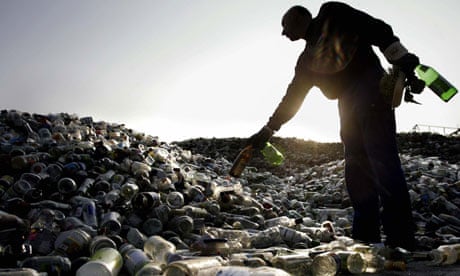Recycling aluminum is a no-brainer – or, at least, it should be.
Producing aluminum beverage cans out of recycled scrap, instead of by mining bauxite and manufacturing new ingots, saves energy, carbon emissions and money. The same is true for the aluminum that goes into cars, planes, electronics and buildings.
If businesses and consumers want to get serious about creating a circular economy – where everything, once used, is made into something else and nothing goes to waste – aluminum is a very good place to start.
Yet the recycling rate for aluminum cans in the US is a mere 55%. That's below the global average of about 70% and well below rates of better than 90% than Scandinavian countries can boast – or Brazil's 98% recycling rate.
The low US rate represents an enormous waste of materials and energy – and a big opportunity. Atlanta-based Novelis is aggressively seizing that opportunity.
The $9.8bn firm converts aluminum into flat sheets, most of which is then turned into beverage and food cans. Novelis is already the world's biggest aluminum recycler, and it aims to do more. Its chief executive, Phil Martens, says the company wants to turn its "whole business model from a traditional linear one to a closed-loop one".
To that end, Novelis this year introduced a breakthrough product called the evercan, an aluminum sheet for beverage cans that's guaranteed to contain at least 90% recycled content.
To learn more, I met with John Gardner, Novelis's chief sustainability officer, who explained to me why Novelis is well positioned to demonstrate, with aluminum, how a circular economy could work.
Novelis was created in 2005 when a Canadian firm then called Alcan, an integrated mining and production company, spun off its downstream operations. (In case you're wondering, as I did, Novelis is a made up word that incorporates the ideas of innovation (novel), speed (velocity) and quality (precision). The company is wholly owned by the Aditya Birla Group, a $40bn conglomerate based in Mumbai.
Because Novelis owns no mines – unlike, say, aluminum giant Alcoa – it's free to pursue a strategy driven by recycling. Gardner says:
"Recycling aluminm is a fantastic thing because you can make exactly the same product again and again. Economically, it makes sense. Environmentally, it makes sense. In terms of resource use, it makes sense." What's more, the capital costs of building a recycling plant are a fraction of the cost of building a primary smelter.
Historically, Novelis's global business had been fed by about one-third recycled content and two-thirds new aluminum. It's up to approximately 43% recycled aluminum this year after setting an audacious goal, two years ago, to reach 80% recycled content by 2020.
The company is investing roughly $500m to nearly double its recycling capacity. In its 2013 fiscal year, which ended in March, Novelis began operations at a new facility in South Korea, which is the largest fully integrated beverage can recycling system in Asia. It also broke ground in Germany for what will be the world's largest aluminum recycling facility and opened the first can-recycling center in Vietnam.
So the seriousness of its commitment is evident. Novelis is pursuing its sustainability strategy "with a great deal more vigor, purpose and creativity than any of its competitors," says Jonathan Porritt, the director of the UK-based nonprofit Forum for the Future, who serves on the company's sustainability advisory council. Says Porritt: "Being 'a little less wasteful' and 'a little more efficient' doesn't hack it; one step-change after another is what's required."
The problem is, Novelis needs help – and lots of it. In the US, for example, the subpar recycling rates mean that demand for recycled aluminum content exceeds the supply. To fill the gap, used cans are shipped from Mexico to the US. That can't be smart.
Only approximately half of the homes in US have access to curbside recycling, and many people with curbside pickup still toss everything into the trash. To capture more scrap, local governments will need to build more recycling infrastructure and consumers will need to change their behavior.
And it's unclear, at this point, who will buy the evercan. Novelis expect to bring the product to market next year, Gardner told me, but neither Coca-Cola nor PepsiCo – the two most obvious buyers – have signed up. In fact, Novelis hasn't announced any customers for the project.
Coke has put its resources behind the Plant Bottle, a PET plastic beverage bottle made partly from plants, while PepsiCo has lightweighted its bottles and promoted recycling. Neither company agreed to an on-the-record interview about evercan.
It may be that Novelis' first customer will be one of the craft beer companies that has made sustainability commitments.
"We've started a dialogue with the brands," is all Gardner would say. "We'll have some [evercans] on the shelves early next year in Europe and the US."
Give the fact that the economic imperative and the environmental needs align so nicely around aluminum, closing the loop shouldn't be all that hard. Then again, Gardner has already seen a great deal of progress since he joined the company 27 years ago. When he built the firm's first recycling plant in Warrington, England, in 1990, the recycling rate in Europe was only around 2%.

Comments (…)
Sign in or create your Guardian account to join the discussion